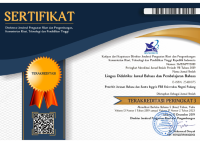The Use of Politeness Strategy in EFL Classroom: Challenges and Opportunities
 ),
), (1) Universitas Gadjah Mada
 Corresponding Author
Corresponding Author
Copyright (c) 2024 Lingua Didaktika: Jurnal Bahasa dan Pembelajaran Bahasa
DOI : https://doi.org/10.24036/ld.v18i2.128230
Full Text:
 Language : en
Language : en
Abstract
Keywords
References
Alakrash, H. M., & Bustan, E. S. (2020). Politeness strategies employed by Arab EFL and Malaysian ESL students in making request. International Journal of Academic Research in Business and Social Sciences, 10(6), 10-20.
Arif, N., Iskandar, I., Muliati, A., & Patak, A. A. (2018). Male and Female Lecturers’s Politeness Strategies in EFL Classroom. International Journal of Humanities and Innovation (IJHI), 1(2), 28–38. Retrieved from 10.33750/ijhi.v1i2.11
Asjuh, N. (2018). Politeness Strategies in Children Communication at Indonesian Religious Kindergarten. The 65th TEFLIN International Conference. Sustainable Teacher Professional Development In English Language Education: Where Theory, Practice, And Policy Meet, 65(1).
Brown, P. (1987). Politeness: Some Universals in Language Usage / P. Brown, S. Levinson. Cambridge: Cambridge University Press.
Fraenkel, J. R., & Wallen, N. E. (1993). How to design and evaluate research in education (2nd ed.). Boston: McGraw Hill.
Ginting, K. L. V. B., & Pasaribu, A. N. (2023). Politeness Strategies in Classroom Interaction between Teacher and Students and among Students at Senior High School. IDEAS: Journal on English Language Teaching and Learning, Linguistics and Literature, 11(1), 289-297.
Grice, H. P. (1975). Logic and Conversation. In Cole P & Morgan J (eds.) Syntax and semantics, 3: speech acts. New York: Academic Press.
Holmes, J. (2006). Politeness Strategies as Linguistic Variables. New Zealand: Elsevier Ltd.
Horwitz, E. K., Tallon, M., & Luo, H. (2009). Foreign language anxiety. In J. C. Cassady (ed.), Anxiety in schools: The causes, consequences, and solutions for academic anxieties. New York: Peter Lang.
Jiang, X. (2010). A Case Study of Teacher’s Politeness in EFL Class. Journal of Language Teaching & Research, 1(5). Retrieved from 10.4304/jltr.1.5.651-655
Kardana, I. N., Satyawati, M. S., & Rajistha, I. A. (2018). Strategies to Create Polite Expressions in Indonesian Communication. Int. J. Linguist, 10(6), 1.
Kassing, R. B. (2011). Perceptions of Motivational Teaching Strategies in an Efl Classroom: The Case of a Class in a Private University in Indonesia. Victoria University of Wellington.
Lakoff, G. (2017). The Logic of Politeness: or, Minding your p’s and q’s. In Regional Meeting of the Chicago Linguistics Society, 9.
Latrech, A., & Alazzawie, A. (2023). The use of politeness strategies in teacher–student interaction in the Omani EFL classroom. Saudi Journal of Language Studies, 3(2), 102-112.
Leech, G. (1983). Principles of Pragmatics. New York: Longman Inc.
Nursanti, E., Andriyanti, E., & Wijaya, I. A. (2023). (Im) politeness employed by multilingual Indonesian EFL learners in argumentative conversations. Studies in English Language and Education, 10(2), 1000-1021.
Pan, Z. (2022). A Corpus-Based Study on Politeness Used by L1 Thai EFL Learners. International Journal of Linguistics, 14(6), 28-47.
Pennington, M. C. (2013). Language in Its Social Context. Hong Kong: MA Course.
Rahayuningsih, D., Saleh, M., & Fitriati, S. W. (2020). The realization of politeness strategies in EFL teacher-students classroom interaction. English Education Journal, 10(1), 85-93.
Salman, H. S., & Betti, M. J. (2020). Politeness and face threatening acts in Iraqi EFL learners’ conversations. Glossa, 3(8), 221-233.
Santoso, D., & Nuraini, F. I. (2021). Leech’s Politeness Principle Used by Teachers in English Language Teaching. In The 1st International Conference on Research in Social Sciences and Humanities (ICoRSH 2020) (pp. 878-885). Atlantis Press.
Saputra, N., Lubis, T., & Setiawan, F. (2021). Politeness strategies for the speech acts of Indonesian language education students in pidie regency. Tradition and Modernity of Humanity, 1(1), 33-40.
Sawir, E. (2005). Language Difficulties of International Students in Australia: The Effects of Prior Learning Experience. International Education Journal, 6(5), 567–580.
Scollon, R., & Scollon, S. W. (2001). Intercultural Communication: A Discourse Approach. 2nd ed. Oxford: Blackwell.
Sugirin. (1999). Studying the Academic Reading Comprehension Process: Responding to Methodological Concerns. HERDSA Annual International Conference.
Sulistiyo, U. (2008). Learning English in an Indonesian University: A Study of Learners’ Preferred Activities. La Trobe University.
Thomas, J. (1995). Meaning in Interaction. New York: Longman.
Wahidah, W. (2017). Politeness Strategies Used by EFL Teacher in Classroom Interaction. Universitas Negeri Makassar.
Wardhaugh, R., & Fuller, J. M. (2015). An Introduction to Sociolinguistics. Seventh Edition. United Kingdom: John Wiley and Sons Inc.
Watts, R. J. (2003). Politeness. Cambridge University Press.
Wright, T. (2005). Classroom Management in Language Education. New York: Palgrave Macmillan.
Wong, L., & Esler, J. (2020). A review of teaching and learning linguistic politeness. Journal of Critical Studies in Language and Literature, 1(4), 13-21.
Yule, G. (2006). The Study of Language: An Introduction. Cambridge: Cambridge University Press.
Zaenul, F. (2016). Teacher’s politeness strategy in EFL classroom and the effect on the learning process. Jurnal Ilmiah Rinjani.
 Article Metrics
Article Metrics
 Abstract Views : 91 times
Abstract Views : 91 times
 PDF Downloaded : 27 times
PDF Downloaded : 27 times
Refbacks
- There are currently no refbacks.
Copyright (c) 2024 Lingua Didaktika: Jurnal Bahasa dan Pembelajaran Bahasa

This work is licensed under a Creative Commons Attribution-NonCommercial 4.0 International License.









